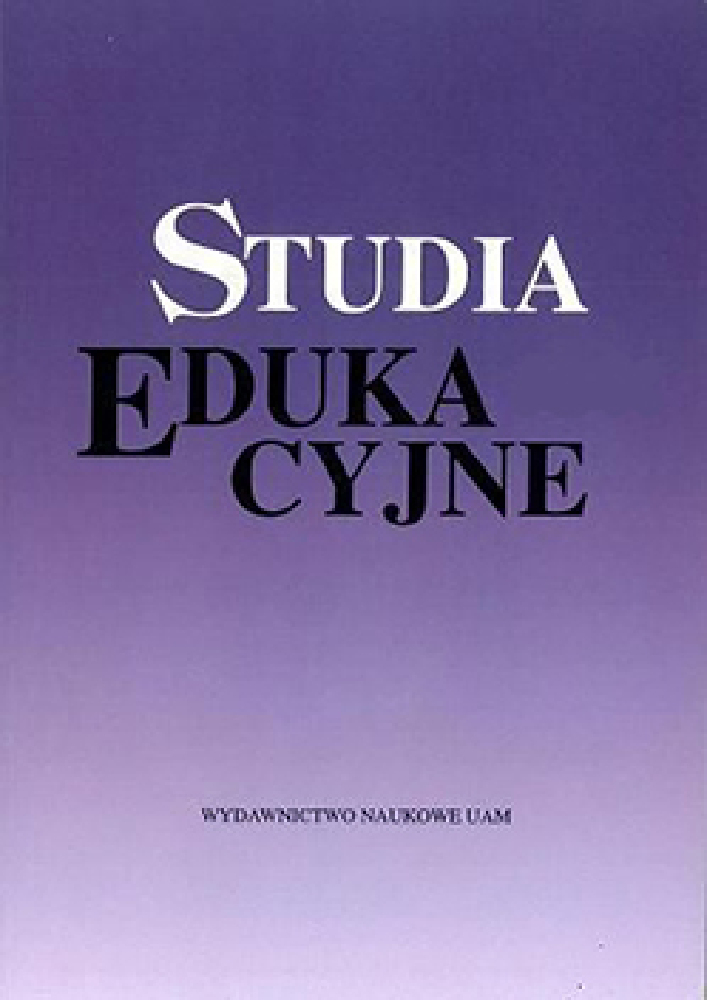Abstract
Pop culture has its significant place in education. It is also a space within which social processes take place and experiences, beliefs and cultural archetypes are presented and discussed. This text is a kind of revisiting of thoughts collected during workshops for young people focusing on various creative processes, particularly writing texts, expression through words and body, introducing elements of theatrical exercises, discussions of popular culture and everyday experiences of workshop participants. The purpose of the text is not just to offer conclusions and reflections after conducting such workshops, but also to critically look at processes like socialization, education and upbringing.
References
Anae N., “Creative Writing as Freedom, Education as Exploration”: creative writing as literary and visual arts pedagogy in the first year teacher-education experience, przekł. P. Prósinowski, Australian Journal of Teacher Education, 2014, 39, 8.
Barthes R., Przyjemność tekstu, Warszawa 1997.
Brol M., Skorupa A., Film jako narzędzie edukacji – perspektywa psychologiczna, [w:] Pedagogika kultury popularnej – teorie, metody i obszary badań, red. W. Jakubowski, Kraków 2017.
Hessen S., Podstawy pedagogiki, Warszawa 1997.
Huizinga J., Homo ludens. Zabawa jako źródło kultury, Warszawa 1967.
Jakubowski W., Pedagogika popkultury – prolegomena, [w:] Pedagogika kultury popularnej – teorie, metody i obszary badań, red. W. Jakubowski, Kraków 2017.
Jakubowski W., Popular culture as an educational space – depictions of utopia in pop culture texts, Studia Edukacyjne, 2018, 49.
Melosik Z., Kultura popularna, walka o znaczenia i pedagogika, [w:] Kultura popularna: konteksty teoretyczne i społeczno-kulturowe, red. A. Gromkowska-Melosik, Z. Melosik, Kraków 2010.
Melosik Z., Szkudlarek T., Kultura, tożsamość i edukacja. Migotanie znaczeń, Kraków 2010.
Miller R., Wychowanie przez świat fikcyjny dla świata rzeczywistego we wczesnym dzieciństwie, [w:] Sztuka dla najmłodszych, Warszawa – Poznań 1977.
Prensky M., Digital Natives, Digital Immigrants, On the Horizon, 2001, 5.
Odniesienia do literatury pięknej/popularnej
Księga cmentarna, Neil Gaiman, 2008.
Nowy wspaniały świat, Aldous Huxley, 1932.
Osobliwy dom Pani Peregrine, Ransom Riggs, 2012.
Zbrodnia i kara, Fiodor Dostojewski, 1866.
Odniesienia do filmów i seriali
Bonny i Clyde, reż. Arthur Penn, 1967.
Chilling Adventures of Sabrina, twór. Roberto Aguirre-Sacasa, sezon 1 - 2018.
Narodziny Gwiazdy, reż. Bradley Cooper, 2018.
Osobliwy dom Pani Peregrine, reż. Tim Burton, 2016.
Riverdale, twór. Netflix, sezon 1 - 2017.
Sex Education, twór. Laurie Nunn, sezon 1 - 2019.
Thelma i Louise, reż. Ridley Scott, 1991.
W głowie się nie mieści, reż. Pete Docter, 2015.
Westworld, twór. Jonathan Nolan, Lisa Joy, sezon 1 - 2016.
Odniesienia do gier wideo
Detroit: Become Human, Quantic Dream, 2018.
Fragments of Him, Sassybot, 2016.
Life is Strange, Dontnod, 2015.
Life is Strange: Before the Storm, Deck Nine, 2017.
Planescape: Torment, Black Isle Studios, 1999.
What Remains of Edith Finch, Giant Sparrow, 2017.

